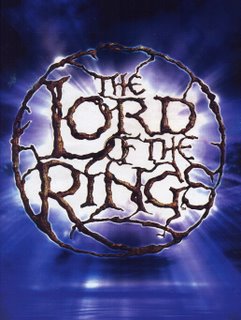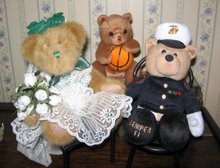in preview (officially opening March 23)
Princess of Wales Theatre
Toronto, Ontario
Some said it couldn’t be done. Some said it shouldn’t be done. It’s been done.
My Initial Prediction: It will SUCK.
Now that I’ve seen it: A flawed but pleasing entertainment.
Updated Prediction:It will tank. Critics will be unkind.
For starters, it’s 3 ½ hours long, plus two intermissions. But then, how could it be otherwise?
It's impossible for me to say, but for someone coming to it without knowledge of the books and/or films, this show just might be utterly incoherent. However, one of our guests, who hasn’t seen any of the films and has only distant memories of the books, enjoyed the musical very much—so who knows?
In terms of characterization and many of the visual effects, this new stage version generally imitates the films, and one ends up admiring it (or not) to the degree that the imitation is successful.
Unfortunately there is not a single acting performance that can be said to take hold of the audience with anything approaching the power of the movies acting ensemble.This is not to say that the acting is really bad—far from it.
(Only one role, Arwen, is a complete disaster. With underemployed actresses available in droves, it is inexplicable that this woman was cast. Her performance is breathy and affected, and totally annoying.) But for all their noble effort, the cast overall is under par.This includes Brent Carver, one of two performers with [Canadian] name recognition, who is surprisingly weak. One would have expected such an experienced actor to overcome his own relative youth and slightness of voice and body, to fully inhabit the ancient wizard Gandalf. But he never manages it. Richard MacMillan, as Saruman, is a strong presence, but neither complex nor especially frightening. Sadly, Evan Buliung as Aragorn is entirely unremarkable, which makes for an even bigger void at the story’s centre than a weak Gandalf.
Victor Young (Elrond), James Love (Frodo), Michael Therriault (Gollum), and the other hobbits (Owen Sharpe, Dylan Roberts, Peter Howe) work hard and are solid.It's just too difficult to know how much credit to give them, since their performances are largely derivative from the films.
Yet I’m glad to have seen this show. It was like a visit with old friends, or maybe a long session with an old photo album, where deep memories have been preserved, so vivid as to be easily brought alive again. My worst fears—visions of dancing Ents, Orcs doing routines out of “Stomp,” and the road to Mordor taking on shades of “yellow brick”—did not in the least materialize. In fact, it is barely a musical—that genre in which song lyrics, musical styles, and dance routines do the work of dialogue by developing characters, defining relationships, relaying information, and advancing the plot.
LOTR:M featured a few character duets (Frodo and Sam, plus the obligatory Aragorn/Arwen love song), but on the whole the singing served as a kind of sound-track: solo reflections (Galadriel singing—not well!—about Lothlarien); scene-setting choruses (elves in odd costumes sounding like a church choir as Rivendell and Lothlarien are introduced—the former dark and indistinguishable from other locations, but the latter magically beautiful); mass sound effects for dramatic scenes, like the battles; and lots and lots of “traveling music.” People were forever charging around in overland circuits.The plot sort of demands this, but considering how many scenes and characters had to be cut, all the running in circles didn’t seem like time well-invested.
The music itself was never memorable (with the exception of the second Sam/Frodo duet)—definitely a show where you leave the theatre “humming the scenery” (which was exquisite). The most standard ensemble number was a barroom song and dance at the Prancing Pony in Bree, which was almost successful—the song was cute and hobbity (though the lyrics, like most of the rest in the show, were largely inaudible), but the costumes suggested an old west saloon (because…?).Other costumes were equally strange, like those of the itinerant human “props” (tree trunks and such) dressed like a chorus of Shi'ite imams.
Still, as I say, the ludicrous possibilities that a musical LOTR conjures up were mercifully absent, and I respect the producers for that.
The show had two HUGE problems, one unavoidable (way too much material—how to edit?) and one entirely avoidable (does anyone understand what this story is really about?).
Any stage show in which an epic tale is to be delivered with masses of spectacular special effects runs the risk of submerging its story in lights and smoke and shifting set pieces. To minimize this risk it helps to have a clear vision of the story’s vital themes, train your eyes on them, and never let go. Had the creative team for this production fixed upon such a vision it would have inspired the actors and been reflected in every performance. From where I sat, they just plain missed it.
Lord of the Rings is about the cosmic war between good and evil, the ultimate battle for the survival of freedom, order, virtue, and life itself. It is not just a societal power struggle (Tolkien was quite clear on that)—it is about whether the continued existence of the Good will be possible.
The prospect of losing this war should be a sickening horror—and those who are evil should horrify, and sicken, on sight. Orcs should be terrifying, their physical deformity a symbol of a moral deformity,on the part of Sauron and his minions, which is more frightening still. (The LOTR:M Orcs didn’t even come close.)
Tolkien is also very clear that, more than anything else, his story is about death—how each life will come, go, and perhaps leave something behind, but maybe not. The fact that when we pass, all the good we have done may pass away too, might break our hearts. But this in no way diminishes our sacred duty to do battle for what is right, whether across vast kingdoms or just in the courtyard of our small corner of the Shire. There is an agony in this, one which for Tolkien was only relieved by his faith, which, however veiled, informs every syllable of his great novel.
Agony of this kind—of the desperate war between good and evil—did not inform Lord of the Rings: the Musical. Without it, everything suffered from a hollowness at its heart which lights and smoke and scenery cannot fill.I was never for a moment afraid that the universe was in danger of decimation and deformity, or that evil would triumph, or even that anyone would die.
I cannot begin to imagine the nightmare of trying to decide what to include and what to jettison from Tolkien’s massive saga. It seems clear that the writers and director of this musical version were, not unexpectedly, so immersed in the material that they had trouble selecting, and in the end they attempted to include too many pieces of information that flew by unexplained or undeveloped.
This could easily be the most ambitious commercial musical production ever undertaken, even if it had not been laboring under the shadow of three staggeringly successful and brilliant (and lengthy) film versions of the same material. Factor in the book/movie/expectations burden, and you have to give these people full marks just for having the gall—as well as due credit for doing as spectacular a job as they did.
Generally I felt content but detached while watching this show. But in one respect it won my heart, that being that it had the wisdom to include the pivotal episode of “The Scouring of the Shire.” To this day I cannot fathom how Peter Jackson could have left it out of the films—to have done so , I think, reveals a critical hole in
The Scouring is the expression, in full bloom, of Tolkien’s themes of our passage toward death— the irreversibility of the wounds, the transformations, and the resignation that time brings to all of us, no matter how much we appear to have gone back to “how it once was.” We don’t-- we can’t-- and others coming after us may live to see all resolutions and restorations quite undone. The musical LOTR paid its tribute to this vital element of the story's conclusion, and of all the painstaking selections that a stage production compelled, this was the best.
So, just like my friend Gwyneth’s movie at last fall’s Toronto International Film Festival, I got to see Lord of the Rings: The Musical for free. And again, I’d gladly have paid.



















1 comment:
I blame Brent Carver.
Post a Comment